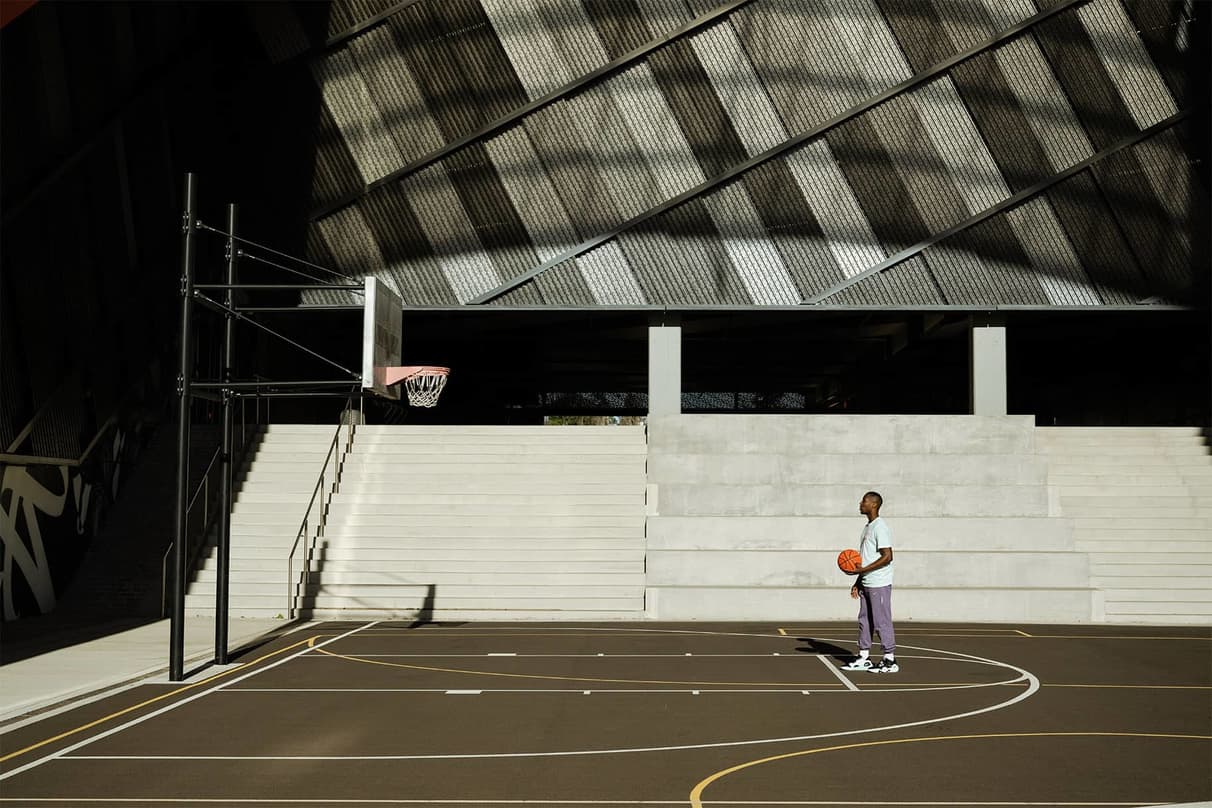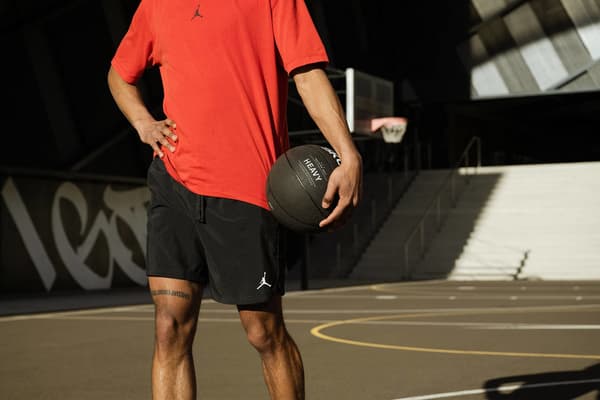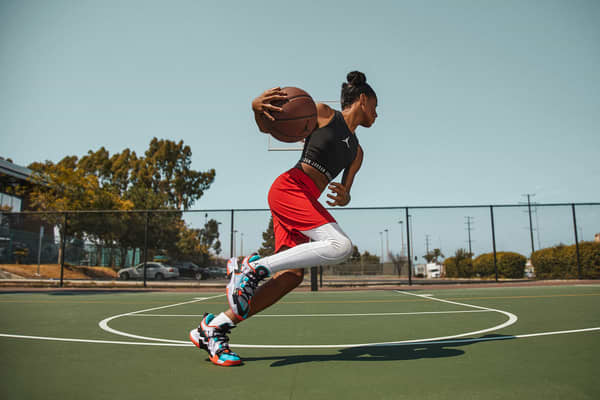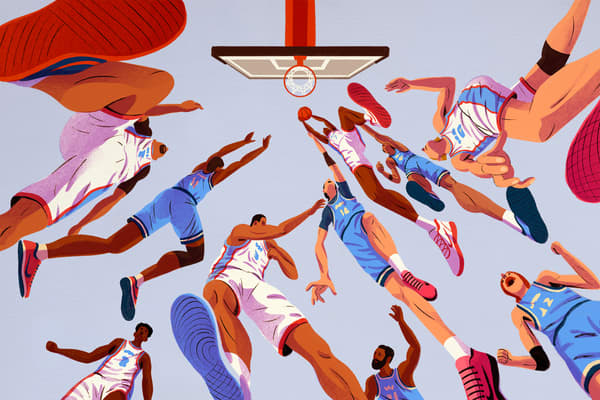Your Guide To Free Throws, According to Basketball Coaches and Pros
Sports & Activity
Nailing this key shot may mean victory for your team.

A free throw offers a unique opportunity to score a point during a basketball game — without interference from the other team. That’s why there’s often so much pressure from coaches, teammates, and fans to sink that shot when the opportunity presents itself.
Free throws are literally free points for your team, said Jamie Hagiya, a former basketball player for the University of Southern California. Plus, many games are decided by free throws.
“When you get to the end of the game, and points start getting tight, you want to make those free throws to win or tie up the game to put it into overtime,” said Matt Beeuwsaert (Coach Beez), a former professional basketball player who coaches in Los Angeles, Calif. In short, it pays to fine-tune your free-throw technique.
(Related: Every Position in Basketball, Explained)
Here, basketball professionals and coaches offer pointers to help you sink every shot.
Free Throw Technique 101

There’s no one way to shoot a free throw, said David Nurse, a former college basketball player. “Each player has their own unique rhythm.”
Some players dribble the ball a few times before lining up for their shot, others spin the ball in their hands — some do both. Some choose to line up both feet so their hips are square with the basket, whereas others only line up their shooting foot (same side as shooting hand) with the basket, Hagiya said.
“As long as the ball releases from your hands in the allotted time, and you don’t cross the free throw line while shooting, anything goes,” she said.
Still, there are a few essential components to a solid free throw.
(Related: 5 Benefits of Playing Basketball, According to Experts)
How To Shoot a Free Throw
1.Relax the Shoulders and Hands

You want good rotation on the ball as you take your shot. When the ball is able to rotate, it has a better chance of bouncing around on the net and falling in, Beeuwsaert said. But you can’t get that rotation if you’re tense while shooting.
“If there’s any kind of tightness, the ball won’t roll off your fingers like it’s supposed to,” Beeuwsaert said.
Try to keep the shoulders and hands as relaxed and engaged as possible anytime you go to shoot a free throw. (See below for advice on how to do this properly.)
2.Let Your Legs Provide Power

The power behind each shot should come from your legs, Beeuwsaert said.
Keep your feet flat — or just your lead foot if you’re using a split-stance — as you prepare for the free throw. Then, bend your knees and explode off your heels to release the ball in a fluid motion, keeping your shoulders and hands relaxed. Be sure to keep your toes on the floor, though.
“You don’t want to jump because your body might fall forward and cross the free-throw line before the ball hits the basket, which is a foul,” Beeuwsaert said.
In other words, your shot won’t count if this happens. Keep your toes on the floor as you explode off your heels.
3.Focus on Staying Balanced

One of the biggest mistakes Beeuwsaert sees players make when shooting free throws is letting their bodies sway forward as they prepare to take the shot, which makes them vulnerable to falling forward, backward, or toward one side.
This movement puts the player off-balance, so that when they extend their arm to follow through, the ball travels anywhere but straight.
“The more balanced you are, the better chance you’ll have of keeping the ball straight and making your free throw,” Beeuwsaert said.
To stay balanced, he suggested imagining you’re encased in a narrow tube when you take your shot. Imagine you can only move upward in the tube — not forward, backward, or side to side.
4.Nail Proper Ball Handling
How you handle the ball while setting up for and shooting a free throw can determine whether you land the shot.
When setting up for a free throw, grip the ball with your dominant shooting hand so the laces on the ball line up horizontally across your fingers. Your opposite (nondominant) hand will be on the side of the ball — “Think of making a 'T' with your thumbs,” Hagiya said.
Then, bring the ball to your shooting pocket (the spot where a player brings the ball before taking the shot) by holding the ball in front of your body with your elbow bent in an “L” shape if you’re right-handed and a backward “L” if you’re left-handed, your wrist cocked back.
As you prepare to shoot, lift your dominant elbow so it points toward the basket and your dominant palm faces toward the ceiling. Your nondominant hand is simply there to guide the ball.
When you take the shot, follow through with your dominant arm. Think of reaching your fingers into a cookie jar on the top of a refrigerator, Hagiya said.
3 Tips for Improving Free Throws
Now that the core elements of free-throw technique have been covered, it’s important to discuss how to execute that technique while on the court.
1.Practice Often

You should practice shooting free throws every time you train, Beeuwsaert said. Ideally, you’ll spend at least 10 to 15 minutes practicing free throws before or after each training session.
Once you get the hang of the technique, develop a free-throw routine. Play around to find the approach you’re most comfortable with, and use it when you practice free throws. If you can invest more time, practice before and after training, Hagiya said.
As Hagiya explained, having a routine can help you shoot consistently and quell those nerves during game time. Decide where you want to look when taking your shot, keeping in mind that most players focus on the front or back of the rim.
“Having a specific focal point can lead to small aim, small miss, so even if you’re off by a little bit, your shot should still go in,” Hagiya said.
Consider practicing the shot until it becomes instinctive, that way “you don’t have to think about it when you get to the free throw line,” she said.
2.Add Pressure to Your Practice Routine

All eyes are on you when you toe the free-throw line during a game. That can create anxiety, making even the most experienced shooter miss the shot, Beeuwsaert said.
It’s not enough to simply practice free throws. Shooting under pressure situations is key to learning how to stay focused and confident when taking your shot, Nurse said.
Beeuwsaert recommended mimicking the pressure of shooting a free throw during a game by creating consequences for missing a free throw during practice. For example, aim to make three free throws back-to-back. If you miss a shot, you have to sprint the length of the basketball court and back, Beeuwsaert said. Or, swap out sprints for another drill you don’t particularly enjoy doing.
Admittedly, the pressure still won’t feel the same as it does when taking a free throw during a game. However, it will at least help you get used to shooting baskets under high-pressure situations, Beeuwsaert said.
3.Build Confidence

Regularly practicing your free throws under pressure is key, but it’s also important to fine-tune your mindset. And the right mindset is to approach the free-throw line as though the shot has already been made, according to Nurse, who coaches NBA players to handle high-pressure situations like free throws.
“When the player is able to alleviate the pressure from the shot, they have a much better chance at making the free throw,” he said.
There’s one trick you can use to get into a confident mindset — especially in a game setting. Nurse tells players to devise a cue word they can use at the free throw line that triggers the memory of a place where they practiced free throws a lot. “Maybe it’s the [name of the] gym where they take their practice shots,” he said. Whatever it is, the word should take you back to a place of minimal distractions, where you feel confident.
Words by Lauren Bedosky
Frequently Asked Questions
When do you shoot free throws during a game?
You can shoot a free throw if you get fouled, or another player makes personal contact with you, as you’re trying to make your shot, Hagiya said. You may also get free throws if the opposing team exceeds their maximum number of fouls allowed in a game, she noted. The maximum number of fouls allowed varies depending on the level, but the National Basketball Association allows four team fouls per regulation period (12 minutes).
How many points are free throws?
Free throw shots, when successfully made, count for one point — per the NBA.
What is the free-throw line distance?
The free-throw line is 15 feet from the backboard.




